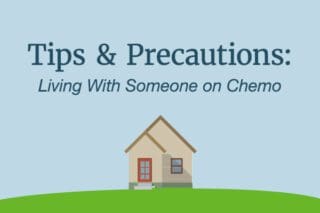
Cancers, including mesothelioma, can affect nutrition and diet. In fact, research shows 30% – 85% of cancer patients experience malnutrition, which comes with serious risks. It can make treatments more dangerous, diminish quality of life and affect recovery. Malnutrition can also increase a person’s risk of death after surgery.
Unfortunately, many treatment-related side effects can contribute to malnutrition. But patients have an array of options for managing these complications and protecting their nutrition. The list below reviews eating-related side effects and expert-recommended strategies for managing them.
1: Loss of Appetite
One of the most common side effects of cancer treatment is a loss of appetite. Chemotherapy, in particular, has been linked to poor appetite. This can contribute to malnutrition and loss of muscle mass, which may worsen treatment outcomes.
What Causes Appetite Loss?
Several factors contribute to appetite loss. Cancer alone may lead to appetite loss, and treatments can make it worse. Treatments that may negatively impact appetite include:
- Chemotherapy: Chemo drugs often cause nausea and vomiting. They may also trigger acid reflux and heartburn. Any of these side effects can diminish a patient’s appetite.
- Immunotherapy: Some immunotherapy drugs may cause nausea, vomiting and stomach pain. These complications may negatively affect appetite.
- Radiation: Radiotherapy targeting the brain, liver or digestive tract can trigger nausea and vomiting. This may cause a patient to lose their appetite.
Nausea can last up to a few days after chemo and other cancer treatments end. But in some cases, it may only last for a few hours.
Changes in taste and smell can also make eating more difficult. Treatment side effects like chemo heartburn, stomach pain and fatigue may also diminish appetite. Many patients report a loss of appetite after surgery.
Managing Loss of Appetite
Patients can explore different ways of addressing a loss of appetite to find what works best for them. Experts recommend eating small, frequent meals, including favorite foods in a calming environment. Drinking fluids, such as water, juice and smoothies can be a good way to add nutritional value and avoid dehydration.
Diet plans for cancer patients often include nutrient-dense foods. Larger cancer centers generally have dietitians on staff. Patients can consult with a cancer dietitian for personalized advice.
2: Taste Changes and Loss of Taste
Cancer patients commonly experience changes in how foods taste and smell. Some people notice a metallic taste after undergoing chemotherapy treatments like cisplatin. Others might find that foods they once loved now taste bland or different. Some patients experience a soapy taste in their mouths. Chemotherapy sometimes causes aversions to meat during treatment. Patients may find these changes lead them to eat less, potentially contributing to malnutrition.
Cancer treatments can also change the way certain foods smell to patients. Changes in the sense of smell can play a role in taste changes and loss of appetite.
What Causes Taste Loss and Changes?
Chemotherapy drugs can damage taste buds, leading to taste changes and loss of taste. Radiation, especially when directed at the head or neck, can also impact taste. Other therapies can cause mouth sores and dry mouth, which may also contribute to taste changes. Taste and smell changes usually stop after treatment ends, but some patients experience them for longer.
Managing Taste Changes
Taste changes can be a challenging side effect of mesothelioma treatments. However, several strategies can help manage these changes and make meals more enjoyable:
- Adapting utensils and dishware: Patients can try using plastic forks, spoons and knives. Glass cups and plates can also make a difference in how food tastes.
- Boosting flavor with spices: Some patients may find it helpful to try new flavors in their meals. Spices and condiments like basil, BBQ sauce, chili powder, garlic, ketchup, mint, mustard, onion, oregano, rosemary and tarragon may help.
- Choosing fresh foods: Patients can try opting for fresh or frozen fruits and vegetables as much as possible. Fresh vegetables may have a more appealing taste. Additionally, blending fresh fruits into shakes, ice cream or yogurt can make a delightful treat.
- Combatting specific taste changes: If foods taste overly salty or bitter, patients can try sweetening them a bit. For overly sweet tastes, adding some lemon juice and salt may help.
- Cooling down food: Serving foods cold or at room temperature can reduce their intensity of taste and smell, making them more palatable.
- Exploring protein alternatives: If red meats seem off-putting, patients can explore other protein sources. Chicken, fish, beans, peas, tofu, nuts, seeds, eggs and cheese are all excellent alternatives.
- Incorporating tart flavors: Foods with tart flavors, such as citrus fruits, lemonade, pickled foods and vinegar, can be appetizing. However, patients who have a sore mouth or throat may want to avoid these foods.
- Marinating to improve flavor: Marinating meats can enhance their flavor and make them more palatable.
- Minimizing unpleasant smells: To reduce the impact of strong food odors, patients can try covering beverages or using a straw. Opting for foods that don’t require cooking can also help reduce offensive aromas. Patients may find it helpful to eat in well-ventilated rooms.
- Refreshing with frozen fruits: Freezing fruits can reduce potentially unwanted smells. This may help patients continue enjoying fruit as a frozen treat. Experts recommend trying frozen cantaloupe, grapes, oranges and watermelon.
- Soothing with sugar-free treats: Patients may find sugar-free lemon drops, gum or mints refresh their mouths and counteract taste changes.
- Using a mouth rinse: Patients can try doing a mouth rinse with a mix of baking soda, salt and water before meals. This can enhance the taste of foods. Regular brushing can also help combat unpleasant tastes.
Everyone’s experience with taste changes is unique. Patients should explore what works best for them and consult with a dietitian for personalized advice.
3: Weight Loss
Maintaining a healthy weight is crucial during treatment. Changes in appetite, taste and smell can reduce food intake, leading to weight loss. Patients who lose weight unintentionally may also have poor nutrition. This can negatively affect quality of life and treatment outcomes.
What Causes Weight Loss During Cancer Treatment?
Several factors can contribute to weight loss in cancer patients. Loss of appetite can lead patients to eat less. Chemotherapy drugs like Navelbine® (vinorelbine) and carboplatin can cause gastrointestinal issues that lead to weight loss. Diarrhea, nausea, vomiting and dehydration from other therapies may also cause patients to lose weight.
Cancer and cancer treatments may increase the amount of food the body needs to maintain a healthy weight. Cancer cachexia is a type of weight loss that occurs when the body needs more calories than usual. It can lead to certain nutrients becoming depleted, including protein, vitamins and minerals. Depending on the severity and the nutrients affected, this depletion may become life-threatening.
These factors combined can lead to severe weight loss that may impact recovery and wellness. Maintaining a healthy weight helps increase the strength and resilience patients need when they receive treatments. Making a diet plan with a nutritionist can help patients stay nourished.
Managing Weight Loss
Eating high-calorie, nutrient-rich foods can help prevent weight loss. Smoothies, protein shakes and healthy fats like avocados and nuts may be beneficial.
Maintaining a healthy diet and proper nutrition can be challenging. Understanding and managing these side effects can help maintain quality of life throughout treatment. Patients should consult a cancer dietitian before making dietary and nutritional changes. The dietitian can suggest food choices that support a patient’s unique treatment goals.
Learn More About Diet & Nutrition for Mesothelioma Patients >




